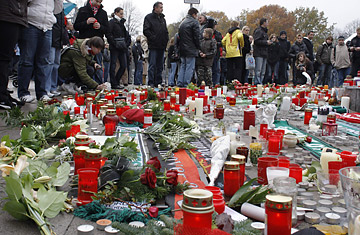
Hundreds of supporters mourn the death of German goalkeeper Robert Enke
Even non-soccer fans were shocked by the sudden, tragic death of Robert Enke, the goalkeeper for Germany's national team, who committed suicide by leaping in front of an express train near the city of Hannover on Tuesday night. The nation practically came to a standstill on Wednesday — German TV carried nonstop coverage of Enke's death, and hundreds of fans converged on the soccer stadium in Hannover to sign a condolence book and light candles and place flowers at the gates.
It wasn't just the suddenness of Enke's suicide that gripped Germany, but the surprise that a player seemingly on top of his game with an adopted infant daughter could have struggled so massively — and so privately — with depression. Teresa Enke, the goaltender's widow, broke down at a news conference on Wednesday as she explained how her husband had tried to conceal his depression from the media out of fear that their 8-month-old daughter, Leila, would be taken away if it became public. "I tried to be there for him, to give him hope," she said. "I drove to training with him to help him get through his depression, but he didn't want to accept help anymore."
Police said Enke's car was found parked near the tracks and that it was unlocked. The 32-year-old left a suicide note in which he apologized to his loved ones and fans for hiding the full scale of his depression. On the outside, Enke was the rising star of German soccer, in line to be the national team's starting goalkeeper at next year's World Cup in South Africa. He had played eight games for Germany since taking over for Jens Lehmann in goal after the European Championships last year. In his club career, he played in more than 190 Bundesliga games for the teams Borussia Moenchengladbach and Hannover 96 over a nine-year span.
"I'm stunned. I don't know what to say," Michael Ballack, the German team captain, told the tabloid Bild on Wednesday. Oliver Bierhoff, the team manager, broke down in tears as he told reporters that even Enke's teammates didn't know about his depression. "I feel completely empty," said Joachim Loew, the team's coach. "He was a great guy. He had incredible respect for others. We will miss him, as a top-class sportsman and an extraordinary man."
Although Enke kept his depression a secret, Germany did get glimpses of an earlier tragedy that enveloped the goalkeeper's family. Three years ago, the couple's 2-year-old biological daughter, Lara, died of a rare heart condition. "I thought the death of Lara brought us closer together. We both thought we could achieve everything," Teresa Enke said, fighting back tears. She said that although her husband had been receiving treatment for his depression since 2003, he found solace in soccer. "Football was everything, it was his life," she said. But in an ironic way, it may have been his love for the game that ended up hurting him the most. Enke was fearful that news of his depression would also end his career, his wife said. "He was terrified of losing his sport," she said. "It is crazy because now it is coming out anyway. We thought we could do everything and we could do it with love, but you can't always do it."
Enke's doctor, Valentin Markser, said the player contracted a bacterial intestinal infection in October that forced him to sit out a number of games. Despite the fact the infection brought on more bouts of depression, Markser said Enke refused to go to a clinic for treatment. "Despite daily treatment for months, we didn't succeed in preventing his suicide," he said.
It seems few people knew how badly he was suffering. In an interview with the German soccer magazine 11 Freunde, however, Enke did give a hint of just how much he was holding back: "When speaking with the press, I always have two opinions. My personal feelings, and those which I serve to the public."
